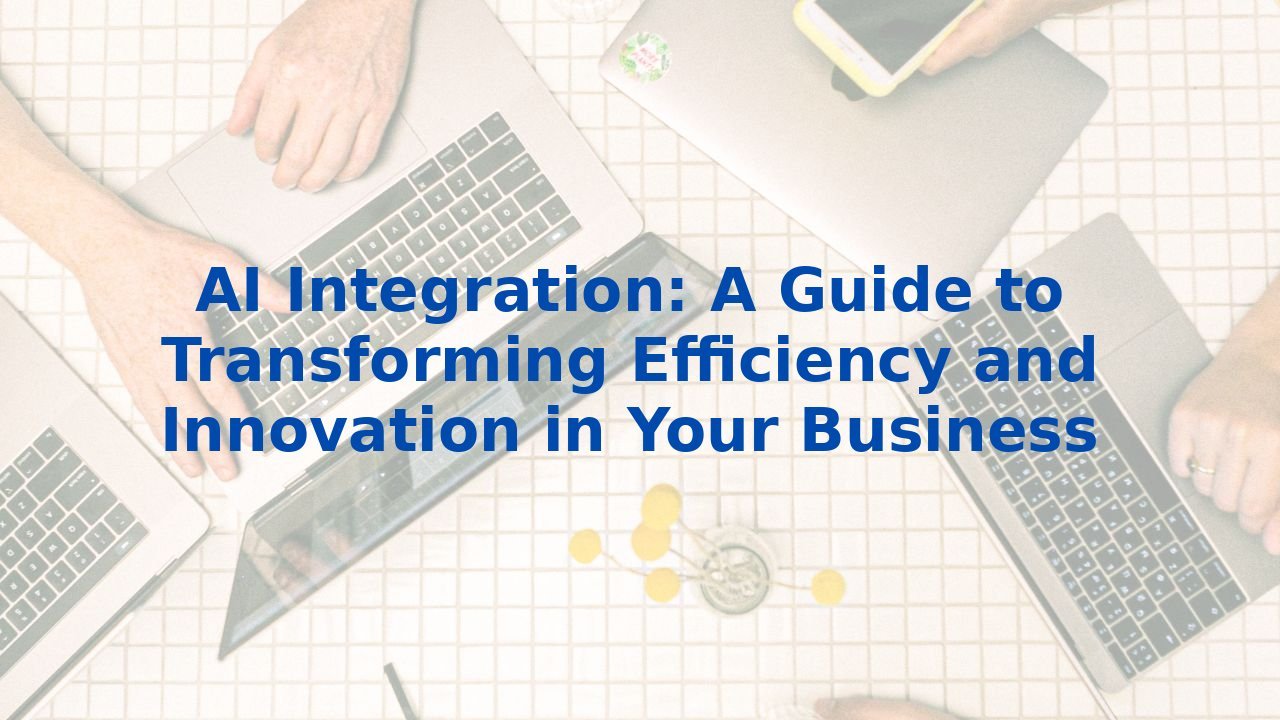AI Integration: A Guide to Transforming Efficiency and Innovation in Your Business
AI Integration: A Guide to Transforming Efficiency and Innovation in Your Business
In a world where agility and innovation define success, the integration of Artificial Intelligence (AI) has transitioned from a futuristic concept to a fundamental need for businesses. The journey toward embracing AI can feel daunting, yet understanding its transformative power is essential. Below, we’ll explore the various business processes that AI can enhance and highlight the profound benefits of its integration for improving efficiency within an organization.
Process Optimization
First and foremost, AI stands as a catalyst for process optimization, streamlining operations across diverse business functions. By automating repetitive tasks, AI not only elevates employee productivity but also inspires creativity. Imagine the time reclaimed when data entry, scheduling, and routine customer interactions are handed off to intelligent systems—now your team can focus on innovation and complex problem-solving.
Consider this: Organizations that leverage AI to automate mundane processes equip their workforce to engage in higher-order thinking. The result? A proactive culture where employees are empowered to take strategic initiatives rather than getting bogged down with low-level tasks.
Predictive Analytics
AI's predictive analytics capabilities offer a significant edge over traditional business methods. By sifting through historical data, AI models forecast market trends and consumer behavior with impressive accuracy. This essential insight aids businesses in anticipating demand, enabling them to make informed strategic decisions and allocate resources wisely.
Actionable Example: Retailers utilizing predictive analytics can optimize inventory management. By anticipating consumer purchasing patterns, they reduce surplus and stockouts, thereby enhancing customer satisfaction and driving sales. Utilizing AI in this manner transforms decision-making from guesswork into a bold, data-driven strategy.
Customer Insights and Personalization
In an era where customer experience reigns supreme, AI provides a pathway to personalization that was inconceivable in previous decades. By analyzing consumer preferences and behaviors, businesses can create tailored marketing campaigns and customer interactions. This level of personalization fosters loyalty and establishes deep bonds with consumers.
Think about it: When customers feel understood and valued, their engagement naturally grows. By employing AI to offer personalized experiences, businesses cultivate a devoted customer base, expanding their competitive advantage.
Cybersecurity and Risk Management
The digital landscape poses endless challenges, yet AI shines as a stalwart sentry for cybersecurity. AI systems can identify anomalies in data patterns, detecting potential threats in real-time. Such vigilance enables businesses to respond swiftly to cyber-attacks, significantly mitigating risks associated with data breaches.
Moreover, through advanced data analytics, AI helps companies extract meaningful insights, allowing leaders to navigate risks proactively. This feature transforms fear into opportunity, as organizations become better equipped to handle uncertainties in the modern business environment.
Innovation and Product Development
Moreover, when it comes to product development, AI accelerates the innovative process. By enhancing the precision of design and production phases, AI aids businesses in trialing concepts more swiftly and effectively meeting market demand. The agility AI brings to product development translates directly into a shorter time-to-market, which is crucial in today’s hyper-competitive landscape.
The Benefits of AI for Improving Efficiency
So, why should your organization prioritize AI integration? The benefits are profound:
- Efficiency and Productivity Gains: AI's capacity to perform tasks at unmatched volumes allows organizations to elevate human effort toward strategic initiatives, enhancing overall productivity.
- Improved Speed of Business: AI shortens operational cycle times, resulting in quantifiable returns on investment and an enhanced competitive stance.
- Cost Reduction: The automation of routine tasks not only leads to cost savings but also minimizes the potential for human error.
- Scalability and Agility: AI tools allow organizations to scale efficiently—handling increased work without the need to expand teams proportionately.
The Importance of Training Employees for AI
While the allure of AI is undeniable, the path to successful implementation goes hand in hand with proper training. Here are reasons to invest in employee AI training:
- Enhanced Productivity: A well-trained workforce leverages AI tools to maximize efficiency, channeling their efforts toward innovation.
- Better Decision-Making: Knowledgeable employees are more adept at harnessing AI analytics for informed decision-making, driving growth and success.
- Adaptability: Ongoing training ensures that employees stay updated with evolving AI technologies, allowing organizations to maintain a competitive edge in the market.
Conclusion
The future of business is evolving, and AI integration is no longer an option—it's a necessity. From process optimization to predictive insights, AI holds the potential to unlock unprecedented levels of efficiency and innovation. As organizations navigate this transformative journey, investing in employee training is equally critical to harnessing AI's full potential. By fostering an environment of continual learning and adaptation, businesses position themselves not just for survival, but for thriving in an intricate and rapidly advancing world.
Embrace AI, invest in your workforce, and chart a course toward remarkable success in the landscape of modern business.



